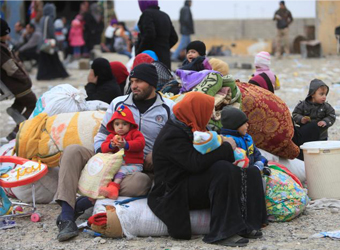The United Nations issued a fresh warning on Wednesday about the humanitarian situation in eastern Mosul where the U.S.-backed Iraqi army is locked in heavy fighting with Islamic State militants.
More than six weeks into the offensive against Islamic State’s last major city stronghold in Iraq, the army is trying to dislodge militants dug in among civilians in the eastern districts, the only side Iraqi troops have been able to breach.
“The situation in eastern Mosul city close to the front lines remains fraught with danger for civilians. Mortar and gunfire continue to claim lives,” the U.N. humanitarian coordinator’s office said. “The limited supplies of food and water are running out, amid concerning reports of food insecurity emerging from the city.”
Water was cut to 650,000 people – or 40 percent of total residents in the city – when a pipeline was hit during fighting, a local official said on Tuesday.
With winter setting in, aid workers say a full siege is developing around the city and poor families are struggling to feed themselves as prices rise sharply.
The longer the conflict drags on, the more civilians will suffer as they are also exposed to violence from the militants bent on crushing any opposition to their rule.
Deputy U.N. High Commissioner for Human Rights Kate Gilmore said on Wednesday there were reports that Islamic State – which has killed residents it suspects of collaborating with the army – shot dead 27 civilians in public in Mosul’s Muhandiseen Park last week.
Three weeks ago at least 20 people were killed and their bodies displayed, as if crucified, at road junctions in the city for passing information to “the enemy”.
CLOSING IN FROM THE WEST
The capture of Mosul, the largest city under control of Islamic State in both Iraq and Syria, is seen as crucial towards dismantling the caliphate which the militants declared over parts of the two countries, after sweeping through Sunni populated northern and western Iraqi provinces in 2014.
Some 100,000 Iraqi government troops, Kurdish security forces and mainly Shi’ite militiamen are participating in the assault on Mosul that began on Oct. 17, with air and ground support from a U.S.-led international military coalition.
Iraqi government and Kurdish forces have surrounded the city from the north, east and south, while Popular Mobilisation forces – a coalition of Iranian-backed Shi’ite groups – are trying to close in from the west.
Last week Popular Mobilisation fighters cut the supply route to Mosul from Islamic State-held territory in Syria, driving up food prices in the city.
With the last supply route cut off, basic commodity prices in Mosul could double “in the short term”, said a humanitarian worker, who declined to be identified.
The U.N. children’s agency UNICEF said the water pipeline that was hit was one of three major water conduits serving eastern Mosul. Iraqi authorities are trucking water in from 35 km (20 miles away), but the supply is insufficient, it said.
“Children and their families in Mosul are facing a horrific situation. Not only are they in danger of getting killed or injured in the cross-fire, now potentially more than half a million people do not have safe water to drink,” said UNICEF’s Iraq representative Peter Hawkins.
WINTER FAVORS MILITANTS
Iraqi forces moving from the east are trying to advance to the Tigris river that runs through Mosul’s center, in the biggest battle in Iraq since the 2003 U.S.-led invasion that toppled Saddam Hussein.
The Iraqi military estimates there are 5,000-6,000 insurgents in Mosul, resisting the advancing troops with suicide car bombs and sniper and mortar fire that also kill civilians.
Islamic State leader Abu Bakr al-Baghdadi, believed to be somewhere near the Syrian border, has told his fighters there can be no retreat from the city.
Some 74,000 civilians have fled Mosul and nearby areas so far, and the United Nations is preparing for a worst-case scenario in which more than a million people are made homeless as winter descends and food shortages set in.
The winter’s cloudy skies favor the militants, Iraqi officers told Reuters in eastern Mosul on Wednesday, as they hinder air strikes.
“When the weather is like this they take advantage,” said Maan al-Saadi, a commander of the elite Counter Terrorism Service (CTS), which is fighting inside the city as it advances from the east.
“The main goal for CTS is the river,” said senior CTS officer Sami al-Aridhi, referring to the Tigris that cuts Mosul in two, 3.5 kilometers (2 miles) away. “The federal police and the army will deal with the western part of the city.”
Source: Reuters
